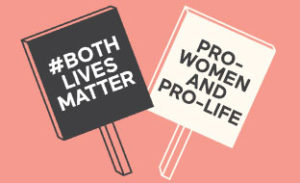I had an abortion.
It devastated my life for many years. I can speak today from a place of healing and restoration. But let me be clear, I am talking about the loss of my son whom I named Stephen. I was born and bred in East Belfast. Number six in a lineup of seven brothers and sisters. I went to Grosvenor Grammar School and by the time I was doing my GCSE exams, I already had a place in the Women’s Royal Army Corps to commence basic training in November that year.
I had been in the Army almost two years when I became pregnant to my first and only sexual partner. He had no idea I was pregnant and he was unreachable. At that time in 1980, it was Ministry of Defence policy, across all three branches of the Armed Services, to dismiss pregnant servicewomen. If you kept your child, even if you were married, stringent re-enlistment rules applied. My ‘choice’ given to me by the army doctor, was stark. If I decided to keep our child, I would lose my home, my income and my career in one fell swoop. My boyfriend wasn’t due back for a few weeks yet so where would I live etc? I caved in to pressure from the Army to ‘choose’ abortion for the various reasons told to me. ‘Think of your career’, ‘you are young – plenty of time to have children’, ‘it’s not a baby anyhow it is just a blob of cells’. All the voices around me were advocates of abortion so I felt I had no other choice.
Completely naive about the facts of what abortion entailed I aborted our son, Stephen, on September 21 1980. I was unaware that Stephen was not a ‘blob of cells’ but at 11 weeks was an actual life, already with a heartbeat and DNA unique to him, completely separate to mine. Unaware that I would be at risk of suicidal thoughts and ideation, I attempted suicide twice. Unaware that miscarriage after abortion is common and that I would lose my first subsequent daughter Lily and that I would have problems bonding with later children, which I experienced with the birth of our first living daughter.
Our law, as it stands, protects us as women and our pre born children. By default, it is also protecting us from the long term detrimental effects of post abortion trauma. With no email, no mobiles, no Facebook or Twitter in 1980, the telegram I had sent to my boyfriend I later found out did not reach him, until it was too late.
My boyfriend, who later went on to become my first husband, would have supported me in my pregnancy had he known. So often, we fail to hear men’s voices as they are left out of the abortion debate and told they have no say. Men are also deeply affected by abortion and men also grieve the loss of aborted children. My first husband and I divorced after 8 years of marriage. I never conceived again during the marriage. Subsequently, he went on to marry again and he has not had children. He lost the opportunity of fatherhood when I aborted our son.
Things have changed, including in the military. You might think my circumstances unique but even now in 2017, the coercive factors surrounding the “choice” of abortion are not dissimilar for many women in the workplace. Many pregnant women, as well as working mothers in NI are still badly treated in the workplace and are discriminated against.
In 2017, now 50 years after the 1967 Abortion Act came on the UK statute books, why are we still encouraging more and more women to choose abortion? There is nothing ‘equal’ about abortion. Why are we not seeking to change our society that bullies women in the workplace who are pregnant or working as mothers? We should be looking to enforce and improve legislation to protect women in the workplace so that we, as mothers, are not pitted against our children in order to gain promotion, keep our pay rates or simply – keep our job.
Knowledge gained at a high price should be shared and not hidden. Knowledge is power – especially when the topic is one where misinformation and deception are more plentiful than the truth. I’ve been there – I know. No job, career or opportunity for travel is worth giving the lives of our children for. Women deserve better.

